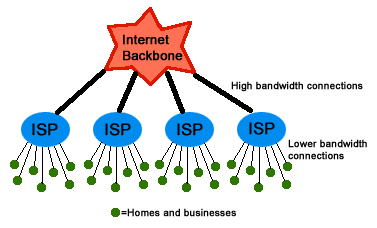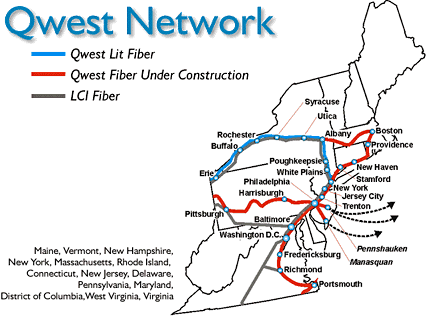 |
 |
|
|
|
|
|
|
|
|
|
|
|
|
|
|
|
|
 |
| Click below to see some references: |
 |
 |
 |
 |
 |
What is the Internet?The Internet is an international network of computers.At the heart of the Internet are only a few "backbone" links on a national level with very high speed and huge capacity (or "bandwidth" - the greater the bandwidth, the more information can travel at one time, and the faster it travels). Backbones usually use fiber optic cable and traffic speed is measured in megabits per second (one megabit per second is a million bits per second!). The Qwest backbone in the Northeast
|
 |
For more information, click on the following then click on "Internet" in the gray bar to the left:
http://www.livinginternet.com
Advanced Topic: IP Address
Every computer that has a means of connecting to the Internet has a unique numeric identifier, called an "IP Address". For example, 12.243.92.5. If you access the Internet through a router, then the router's IP address will be used.
Your IP address is: 216.73.216.187
For more information on IP addresses:
http://www.howstuffworks.com/question549.htm
Advanced Topic: How can all Those Different Computers Communicate?
At the heart of the Internet is a standardized communication language called TCP/IP (Transmission Control Protocol/Internet Protocol).
IP (Internet Protocol) is the program responsible for delivering "packets" of information over the gigantic Internet network.
TCP (Transmission Control Protocol):
- starts a "session" with the computer being contacted,
- checks to make sure that the data arrives there without any corruption, or damage; and
- ends the "session" when all the information has been successfully transmitted.
For a very thorough and somewhat advanced introduction to TCP/IP:
http://www.itprc.com/tcpipfaq/default.htm
|
Copyright © Rachel Peck 2003 - all rights reserved
|



